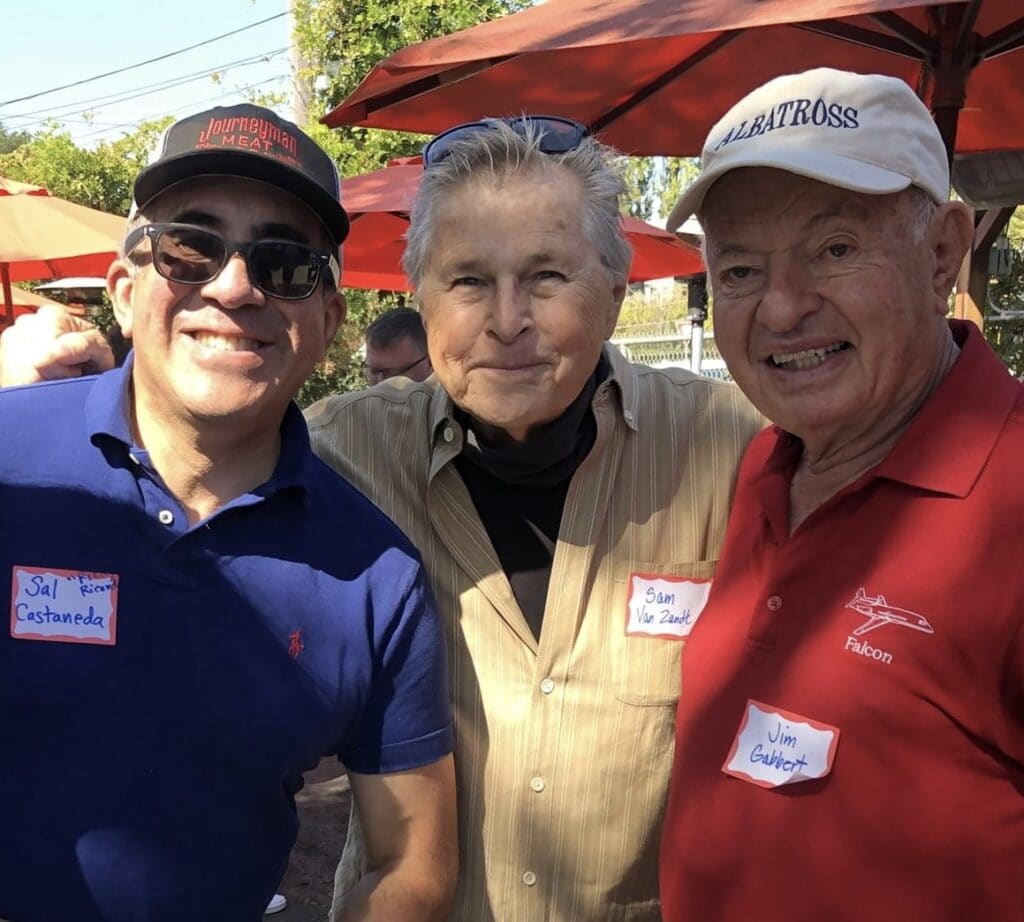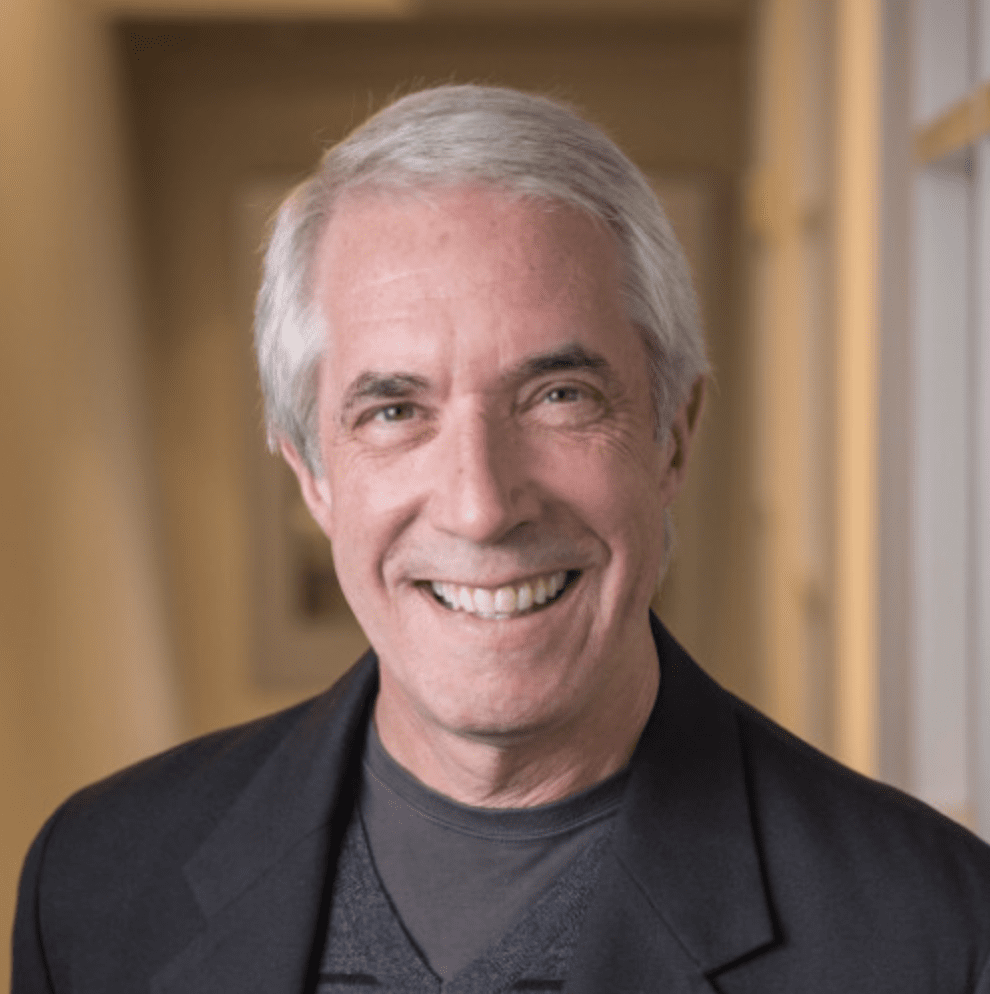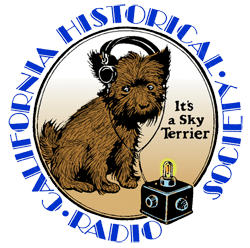It was a dark and stormy morning. It was the first day I drove from the South Bay to begin work in San Francisco Radio! It was October 2, 1972, and it had rained hard and steady all night. I was expecting to begin my first morning show on KCBS-FM, which was flipping formats to Oldies that day. But the weather gods had other plans, and when I showed up at One Embarcadero Center’s 32nd floor, Chief Engineer Ozzie Graham was waiting for me. The station had been knocked off the air! My big debut would have to wait until the engineers could fix it. Now what? I went across town to visit my friend Tim Hartman. Tim was doing middays at KSFX, the ABC-owned rocker, where he worked with KFRC exiles Bob Foster and Frank Terry. I’d been stealing lines from Frank at KFRC when I was at KDON in Salinas. The style of the time was to give information and maybe humor in 15 seconds or less. Frank was among the best, and the first San Francisco DJ I met. Exciting for me! He immediately gave me the nickname “Sambox”. Don’t ask-I don’t know.
Frank always drummed when he was on the air – brought his own sticks. When I worked with him at KNEW-KSAN, he shredded the wood on the console base. So they installed a drum pad just for Frank, and when they built new studios in San Francisco, the studio design included a built-in drum pad, exclusively for Frank and his sticks.
Playing golf with Frank was goofy – he once made me take a penalty for stepping near his putting line. “Sambox – it looks like you’ve stepped in it again. Take a penalty” He came to my 50th birthday party with his longtime love, “Miss Nancita” and they tore up the dance floor, then Frank played drums with the band! He was definitely different, and we were friends to the end – Frank died of cancer long after he’d retired – but before that, he enjoyed retirement to the Gold Country by playing drums in local bands in Murphy’s.
Back at KCBS-FM, the DJ lineup was made up of PD Bill Keffury, Music Director Steve Walker (Newman), Bill Dodd, who’d already worked at KSFO and KIOI by then, and a character named Brian Roberts, who had used the name Buck Rogers at KYA. We were a game bunch, but frankly, I didn’t know much about performing at that level of radio.
KCBS-FM was an AFTRA station, and union scale at KCBS-FM in 1972 was $263 a week. Like I said, I didn’t know crap, so when the General Manager decreed we were to be paid $250 a week, I went along, until my friend Tim Hartman told me I was being cheated out of $13 a week! $56 a month! Tim urged me to tell AFTRA. Being there just a couple of weeks, I was afraid of losing my job over it, but I did it anyway. AFTRA checked it out, and the GM lost his job. Over $13 a week! I can only guess he was trying to keep the budget down, but what a cheesy way to lose your job.
I liked most of the characters at KCBS-FM. Bill Keffury was a nice guy to work for, and he had history. I’d heard Bill at KYA when I was in school in the 60’s. On KYA, they called him “The Crazy Arab”. I’m pretty sure you couldn’t get away with that today. Bill was a good coach, too. Bill heard my little bad habits and would gently help me break them.
Steve Newman (Walker) – he went by both names, appeared to have the life of a San Francisco DJ nailed – he lived a couple of blocks away from the station in a high rise apartment, and liked to say his feet never touched the ground between home and work. Steve’s history included building his own radio station in his early teens out in the Richmond District of the City. Legend had it he was shut down when someone from the FCC came to his door and told his mom. He was a gentle, witty guy who kept himself to himself, mostly. He faded from the scene sometime in the 80’s, and I later heard he’d died. I like to believe he’s built his own radio station up in that great studio in the sky.
Being an unsophisticated kid from San Jose meant feeling a little out of place in the Big City. But KCBS-FM was down the hall from KCBS, the top-rated news station, and that meant meeting heroes. Kenny Ackerman did all-nights at KCBS, so he was among the first co-workers I would see early every morning around the coffee and pastries that were provided daily. He was also one of the nicest guys in radio, always saying something to encourage me and make me feel like I was welcome. Dave McEllhatton was the morning anchor, and also a very nice guy. Between them, I soon felt like I belonged to the club.
Sometime in early 1973 KRE radio, which was owned by newsman Chet Huntley, became the subject of a strike. I was new, so never knew the details, but AFTRA asked members to go to the East Bay and “picket” the station. It was a cool place – a deco style building and it felt more real – not in some high rise in The City – just a cool location. It was on the “picket line” that I met some of my radio heroes – I remember tossing a football around with Chet Casselman and Russ Syracuse. The most-fun protest ever!
In a couple of years, I was fairly well established at KCBS-FM, doing mornings and writing and producing a feature called “60 Seconds” that got some attention. Over the next few years, job offers came in – usually for the same money, but I stuck with CBS. But one day, when I’d auditioned to do an entertainment feature on KGO-TV, the boss called and told me CBS brass didn’t want me to do it, since KGO was ABC-owned. It was a chance to do TV – albeit for a 10 minute feature once a week, and I didn’t want to give it up. So, I hung up and called James Gabbert at KIOI. Jim had offered me a spot about a year before and I’d declined, but he said he’d hire me for PM Drive at KIOI.
That afternoon I was in an accident – broke my jaw and shoulder. I spent a few days in the hospital, and secretly made plans to move to KIOI. Working for Jim Gabbert was risky because he had a tendency to fire people, and I voiced my concerns when we met. He swore he’d never do that, but over the course of a few years working for Jim, I managed to get fired several times! And he didn’t just terminate me; he’d tell me how embarrassed he was to have hired me, in a way that probably would send up flags at HR in most stations today. Challenging times for one’s self-esteem! Then he’d hire me back after he’d calmed down. Once, I played a song he didn’t like. Never mind that it was on the list. He came in and told me I was fired and started to sit down. I acrobatically made it to the chair before him and said, “At least let me finish my show”. By the time my shift was over, all was forgiven. The last time he fired me was at his TV station, TV20. I’d been hosting the 10 O’clock Movie for a few years. He had me do some generic tracks because “the station was being remodeled or something”. After I did the generics, I was fired. Rather than make a fuss I went to Jim and thanked him for the opportunity and left. A few weeks later he hired me back. I was told that he liked my attitude while being fired. A year or two later I quit his TV station, never having to worry about being fired by Jim again. Even though his management style disagreed with me, I had to admire James Gabbert, who built a radio station straight out of college, then parlayed it into the purchase of a TV station, which he later sold for over $100 million. Not many in management actually know how to fix everything at the station. Jim Gabbert did. He built it!
Telling stories on my San Francisco peers is a delicate matter, so here are a few with no names attached. I worked Oldies stations a lot – KCBS-FM, KIOI-AM, KYA, KFRC, and some Oldies jocks are kind of strange. There were the guys – more than one – who would put the phones on hold at the start of their shows, then ask for callers while saying how busy the phones were! If you ever got a busy signal at a station, it was likely for show.
One Oldies DJ knew everything about every song – because he collected 45s from the 50’s and 60’s. He was kind of nerdy about it, but you had to respect his knowledge.
A famous morning man I worked with strongly disliked me, and it showed. I probably earned his distaste, but it wasn’t easy trying to get along with him. After a year or two of trying, I gave up. We just never talked again. That worked out very well for both of us.
In my experience, one of the drawbacks of doing radio is that most DJs kind of put on a game face, so you never really get to know each other as people.


One more, and I’ll let you go – in the mid 80’s I worked on a station with a really good morning show – one guy and three cohorts from the news department. He was quick and funny and sounded awesome on the air. But off the air, face-to-face, he was a real jerk. Once, I got my nerve up and asked him to please clean up after himself at the end of his shift, since I had to follow him. His reaction was to dump his ashtray and crumple up his newspapers extra messy every day. He would disappear after his shift, and my job before I did middays was to get hm to voice spots. To make it happen, I had to wait at the studio door. If I missed him, I would find him at a neighborhood bar. Not my happiest radio experience. The afternoon guy used to play cuts from popular comedy albums. It was fun until the time he didn’t listen to the cut before playing it: Rodney Dangerfield got no respect; “When I was a kid, my dad used to tell me to play Hide and Go F**k yourself”! After that, comedy cuts were auditioned before airing, but the DJ survived. More later.

